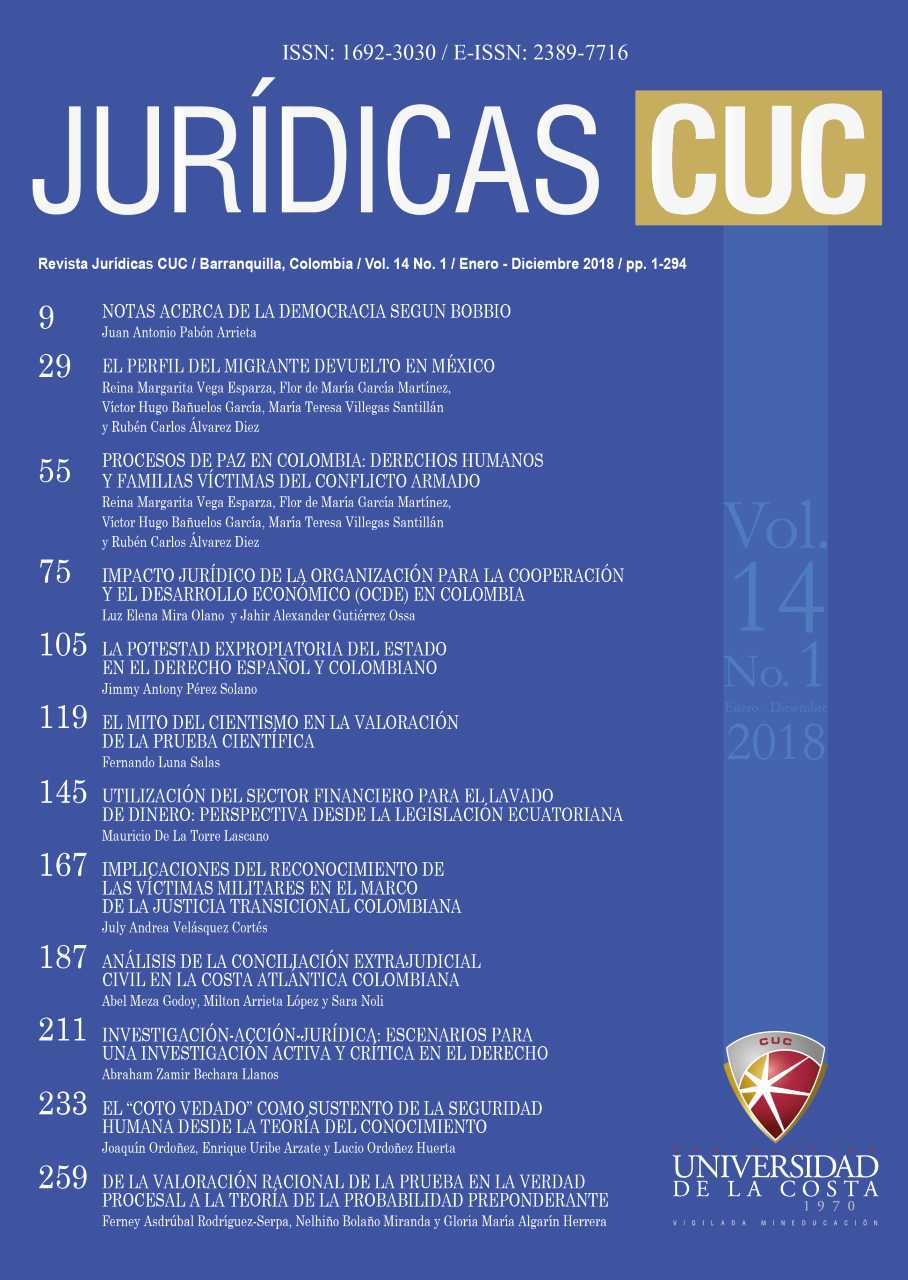The myth of scientism in the evaluation of scientific evidence
DOI:
https://doi.org/10.17981/juridcuc.14.1.2018.06Keywords:
Daubert standard, assessment, standards of reasonable evaluation, scientific evidence, pseudo ex-pert,, pseudo expert,, scienceAbstract
This legal-reflective work, developed from a qualitative perspective with a literature review, aims at analyzing the rational attitude of judges regarding the scientific nature of the evidence. This paper sets out the difficulty encountered during the judiciary labor of justice administrators when evaluating the scientific evidence presented in different legal proceedings, since a set of extrajudicial information is required for that purpose. In most cases, this knowledge is non-existent. As a result, the judge is led to blindly trust what it is specified by the experts in their reports, thus, opening a door into the process to flawed evidence and allowing legal proceedings to be solved without a real assessment of them or the suitability of the expert.
Downloads
References
Arazi, R. (2008).Prueba ilicita y prueba científica. 1ra ed. Santa Fé: Rubinzal Culzoni.
Carrillo, Y. (2013).Cientificidad y racionalidad en la ciencia jurídica. Cartagena: Universidad de Cartagena.
Denti, V. (1972). Cientificidad de la prueba en relación principalmente con los dictamenes periciales y la libertad de apreciación del juzgador. Revista de Derecho Procesal Iberoamericana, 2(3). 277-301.
Devis, H. (1967). Iniciativa probatoria del juez civil. Revista Iberoamericana de Derecho Procesal, 4. (68-109).
Edmond, G. y Mercer, D. (1998). Trashing “Junk Science”. Stanford Technology Law Review, 3(1).
Ferrer, J. (2007).La valoración racional de la prueba. Madrid: Marcial Pons.
Gascón, M. (2010a).Los hechos en el derecho. Bases argumentales de la prueba. 3ra ed. Madrid: Marcial Pons.
Gascón, M. (2010b). Prueba científica: mitos y paradigmas. Anales de la cátedra Francisco Suárez, 44(1). 81-103.
Gascón, M., Lucena, J. y González, J. (2010). Razones científico jurídicas para valorar la prueba científica. Una argumentación multidisciplinaria. La Ley 5619, 31(7481).
Haack, S. (2007).Defending Science within Reason. Between Scientism and Cynicism. New York: Prometheus Books.
Hempel, C. (1966).Filosofía de la Ciencia Natural. Madrid: Alianza Editorial.
Huber, P. (1993). Galileo’s revenge: Junk Science in the Courtroom.New York: Basic Books.
McCormick, M. (1982). Scientific Evidence: Defending a New Approach to Admissibility. Iowa Law Review, 67. 879-916.
National Research Council of the National Academies, NRC. (2009).Strengthening Forensic Science in the United States. A Path Forward. Washington, D.C.: The National Academies Press.
República de Colombia. Corte Constitucional. Sala Tercera de Re-visión. (19 de agosto de 2009).Sentencia T-555/09. [M.P. Luis Ernesto Vargas Silva].
República de Colombia. Corte Constitucional, Sala Tercera de Re-visión. (13 de agosto de 2009).Sentencia T-589. [M.P. Eduardo Cifuentes Muñoz].
República de Colombia. Corte Constitucional. Sala Octava de Re-visión de Tutelas. (7 de marzo de 2006).Sentencia T-171. [M.P. Clara Inés Vargas].
República de Colombia. Corte Suprema de Justicia, Sala de Casación Civil. (15 de junio de 2016).Sentencia SC 7817. [M.P. Margarita Cabello Blanco].
República de Colombia. Congreso de la República. (31 de agosto de 2004).Por la cual se expide el Código de Procedimiento Penal.[Ley 906]. Diario Oficial No. 45.658.
Rivera, R. (2012). Derecho constitucional de la prueba. En, VIII Con-greso Internacional de Derecho Procesal, ( 211-232). Universidad Libre seccional Cúcuta, Colombia.
Royall, R. (1997).Statistical evidence. A likelihood paradigm. London: Chapman & Hall/CRC.
Taruffo, M. (2005). Conocimiento científico y estándares de prueba judicial. Boletín Mexicano de Derecho Comparado, nueva serie, 38(114), 1285-1312. Recuperado de http://www.scielo.org.mx/pdf/bmdc/v38n114/v38n114a13.pdf
Taruffo, M. (2010).Páginas sobre justicia civil.Madrid: Marcial Pons.
Tellus Institute (2013).Daubert: The Most Influential Supreme Court Ruling You’ve Never Heard of. Publication of the Project on Scien-tific Knowledge and Public Policy. Boston.
Tirado, J. (2015).Curso de pruebas judiciales. Tomo I. Parte General. 2da ed. Cartagena: Doctrina y Ley.
Vázquez, C. (2015).De la prueba científica a la prueba pericial. 1ra. ed. Madrid: Marcial Pons.
Yáñez-Meza, D. & Castellanos-Castellanos, J. (2016). El derecho a la prueba en Colombia: aspectos favorables y críticos de la reforma del Código General del Proceso en el derecho sustancial y procesal. Vniversitas, 132. 561-610.
Weinstein, J. y Berger, M. (2010).Weinstein ́s Evidence Manual: A Guide to the Federal Rules of Evidence Based on Weinstein’s Fe-deral Evidence. San Francisco: LexixNexis.
Downloads
Published
How to Cite
Issue
Section
License
The authors are exclusively responsible for the published articles, which do not necessarily reflect the views of the editorial committee.
JURIDICAS CUC respects the moral rights of authors who have assigned the property rights on the published materials to the editorial committee. In turn, the authors declare that the work they submit has not been previously published.


 English
English
 Español (España)
Español (España)



